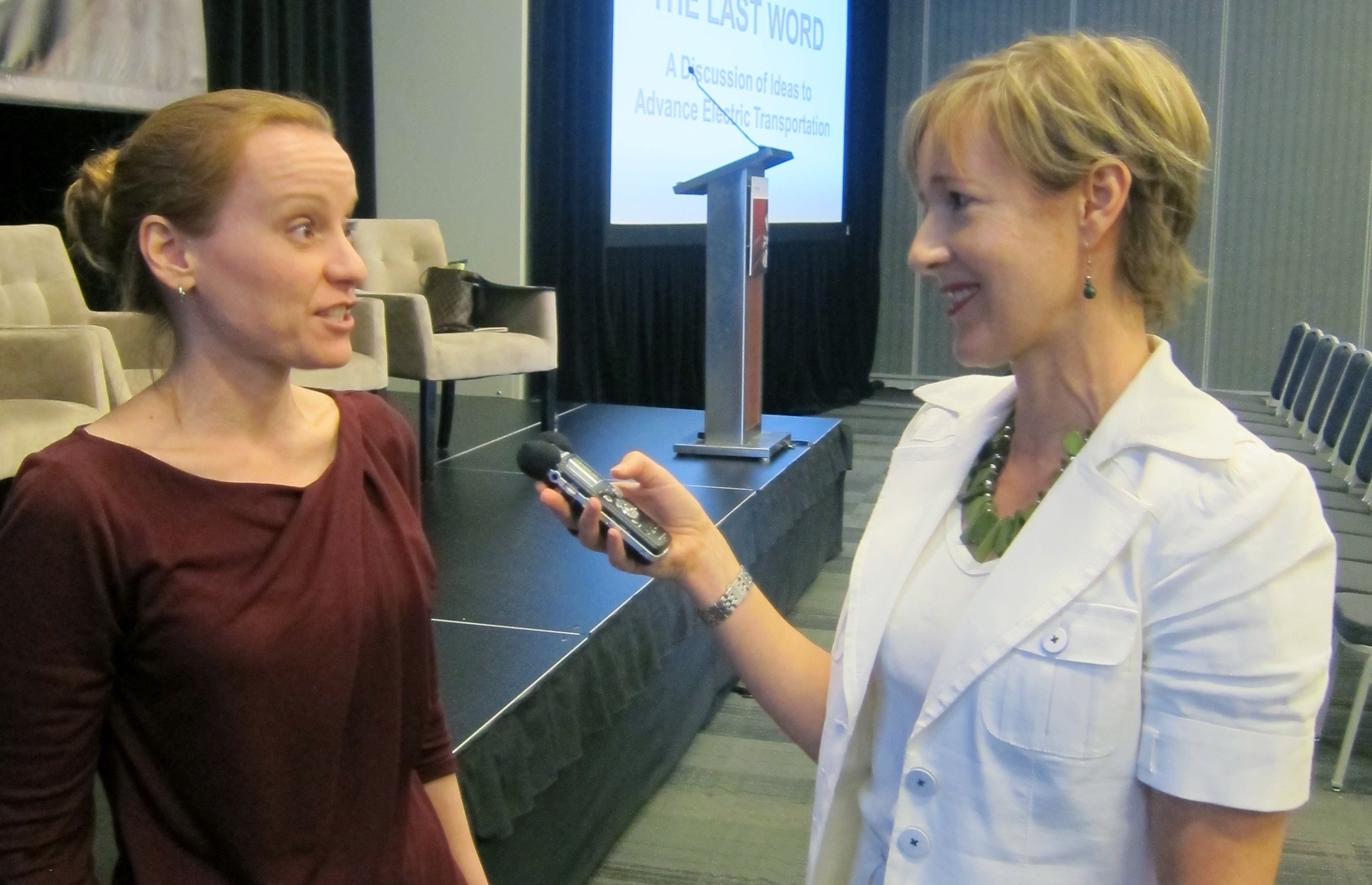
Sep 15, 2014 | Electric Vehicles
By Alison van Diggelen, host of Fresh Dialogues
Chelsea Sexton is famous – among electric car fans – for her role in the documentary “
Who Killed the Electric Car?” I caught up with Sexton at this summer’s
Plug-In Conference in Silicon Valley and she emphasized the importance of “getting butts in seats” – electric vehicle seats that is – in order to expand the adoption of EVs.
An employee of GM, Sexton was part of the L.A. team tasked with leasing the first commercial electric vehicle:
the EV1. When GM decided to recall the car, she became a vocal opponent of the recall, but that didn’t stop the company crushing the majority of the fleet. It’s an episode in EV history that makes quite
Tesla’s Elon Musk emotional (see @39:25 in our
in-depth interview).
Today, Sexton is an outspoken advocate for the development and expansion of the electric vehicles market, and helped launch the
Automotive X Prize. Here are some highlights of our conversation:
On expanding electric vehicle ownership
“Getting butts in seats is key,” Chelsea Sexton
This mantra was repeated several times by Sexton and her fellow panelists, during the last Plenary Session: Ideas to Advance Electric Transportation.
The rationale is that the more people who experience the acceleration and performance of electric cars, the more people will buy them. Programs like Experience Electric and National Drive Electric Week (Sept 15-21) are tackling this challenge.
On why she loves electric vehicles
“I love torque more than anyone rightfully should…that experience of off-the-line speed, and racing one car against the other…that’s torque. Bill Nye jokes that I have a lead foot…I have a lithium foot.”
Sexton used her “lithium foot” during a
Wired Magazine assignment in 2013, when she got to drive the all electric Yokohama HER-02 EV.
On where electric vehicles are today
“The last few years have been the giddy freshman – we finally have electric cars again – years and now we’re in the phase – the sophomore slump – where it’s time to dig into the less sexy nuts and bolts and infrastructure.”
On the future of electric cars
“I’d like to see them no longer a novelty. The next 5 years will determine what will happen…we hope to see more vehicle types and be less reliant on incentives and be more self-sustaining.”
On Tesla Motors
“It’s the most aspirational example of an electric car…Elon (Musk) is rocket man, so who’s not excited by that?”
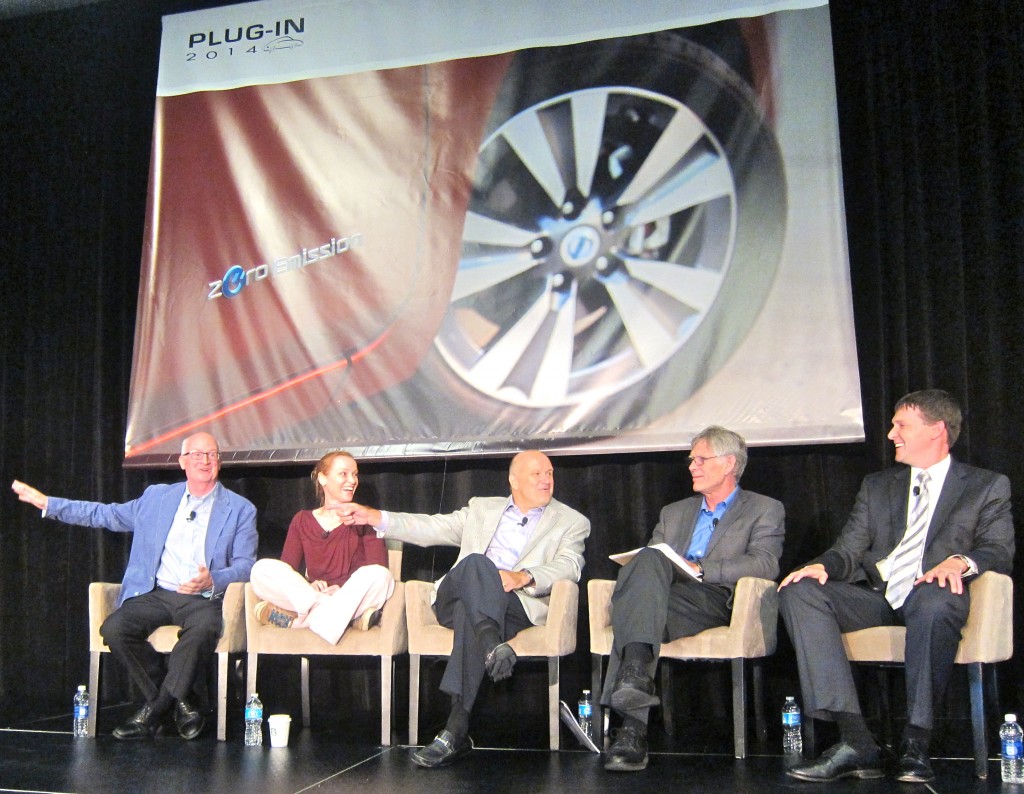 2014 Plugged-In Conference Plenary Session: Ideas to Advance Electric Transportation
2014 Plugged-In Conference Plenary Session: Ideas to Advance Electric Transportation
From Left:
Watson Collins, Manager, Research & Business Development, Northeast Utilities
Chelsea Sexton, Founder, Lightning Rod Foundation
Edward Kjaer, Director, Transportation Electrification, Southern California Edison
Tom Turrentine, PH&EV Research Center, Institute of Transportation Studies, University of California, Davis.
Dan Bowermaster, Program Manager, EPRI, Electric Transportation, Electric Power Research Institute
Find out the latest news about Electric Vehicles and Driverless vehicles, reports from Fresh Dialogues
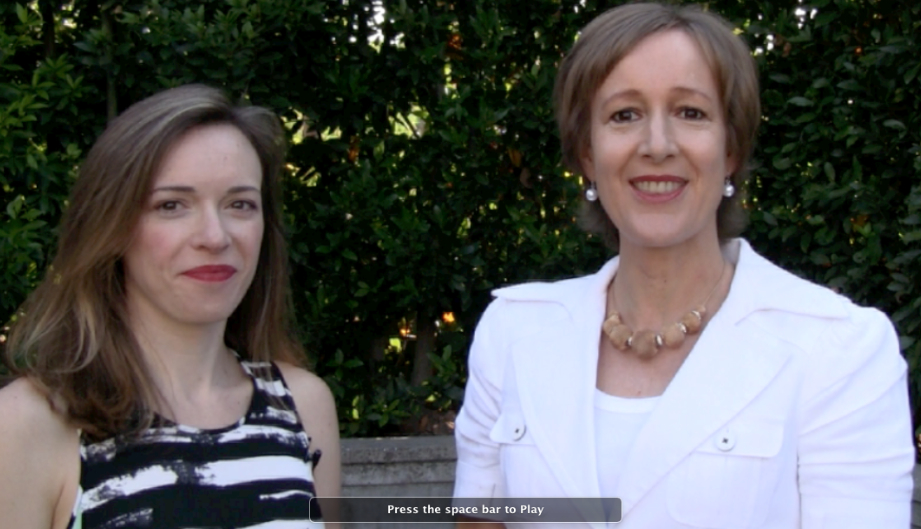
Jun 18, 2014 | Inspiring Women, Women in tech
By Alison van Diggelen, host of Fresh Dialogues
Jackley took a few moments with me to share tips for aspiring entrepreneurs and some clues about her latest startup, launching this Fall.
She enthuses about Silicon Valley being “an incredibly special pocket of the world” where “people have a great capacity to imagine new futures.”
“So many people here have the resources and skills to make these new stories unfold, become real,” she adds.
Here are some highlights of our conversation.
Tips for aspiring entrepreneurs:
1. Be passionate
Do something you are passionate about and have a vision for.
2. Start small
Remember Kiva began with seven entrepreneurs and a little over $3000. It recently surpassed the $500,000,000 mark in microloans to entrepreneurs around the world, serving almost 2 million Kiva users in 76 countries. The average loan amount is $10.
3. Be excellent
Serve one person, or one community well and build from there. Be thoughtful, intentional and think about the details. Study and absorb what’s unfolding in front of you, and be present.
On her new startup
1. Focus
I’m excited to focus on serving working parents…I’m in the trenches right now and that’s the people I want to serve.
2. The Problem
I hope to consult with companies on their policies, culture that supports or doesn’t support working parents. There’s a lot of room for improvement in existing companies.
3. The Solution
My goal is to make it easier and provide options for working parents to prioritize and design their own work and lives around that. Parenting is one of the most entrepreneurial things that I’ll ever do. There’s so much that maps from my experience into motherhood that I want to share with other people. I want to work at the company level and with individuals to demand what they want.
4. The Context
In Europe, it’s top down, (working parents) are taken care of by institutions. I don’t want to wait for that (policy change) to happen here. It’s the better and faster way to go here, in this (US) culture.
Find out more about other SVForum visionary award winners and check back soon for interviews with Stanford’s Tina Seilig, VC Tim Draper and Jennifer Pahlka, founder of Code for America.
Come join the conversation on Facebook
This video is part of a special “Inspiring Women” series at Fresh Dialogues featuring Meryl Streep, Sheryl Sandberg, Jennifer Granholm, Maureen Dowd, and Belva Davis. Check out the YouTube video series here
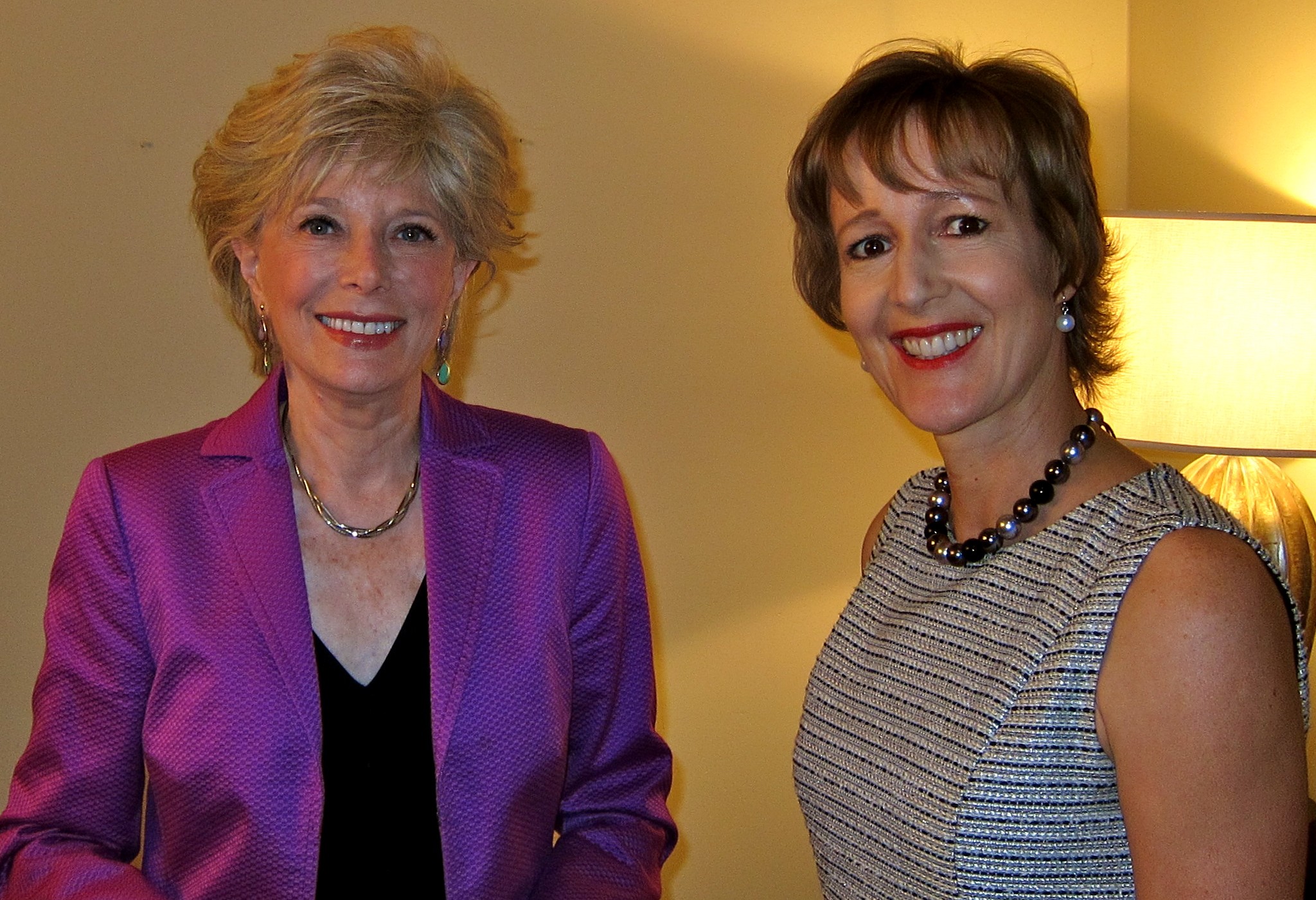
Jun 3, 2014 | Clean Tech, Climate Legislation, Education, Green World, Inspiring Women
One day after the sweeping new rules to limit power plant emissions were announced by the EPA’s Gina McCarthy, China just announced a major carbon emissions cap. Yet the climate change deniers and the the coal lobby are campaigning to preserve carbon polluting energy. It’s valuable to reflect on why these new rules are critical to the future of mankind.
As McCarthy described it, “We have a moral obligation to the next generation to ensure the world we leave is healthy & vibrant.”
Others might be more direct: It’s climate change, stupid.
I recently interviewed CBS 60 Minutes Correspondent Lesley Stahl and she shared her emotional reaction to climate change. She witnessed the rapid ice melt in Greenland and reported about it for Years of Living Dangerously, the documentary series on climate change.
“I thought global warming needed an alarm bell rung before I went, but it was extremely emotional for me to see first hand the ice melt,” says Stahl. “…knowing what it’s going to do for the rest of the planet.”
She’s talking primarily about global sea level rises, but there’s also the devastation that will occur due to rising temperatures, widespread drought and the increasing frequency of deadly storms like Hurricane Sandy.
Find out more about Stahl’s report for the Years of Living Dangerously series here. It’s produced by David Cameron and features reports from Tom Friedman, Matt Damon, Jessica Alba and Don Cheadle.
The interview was recorded at the Foothill College Celebrity Forum Series in Silicon Valley on May 15, 2014.
Check out my interview with Lesley Stahl on Barbara Walters’ legacy.

May 16, 2014 | Inspiring Women
By Alison van Diggelen, host of Fresh Dialogues
Last night, I caught up with acclaimed journalist Lesley Stahl to discuss Barbara Walters’ retirement. Here’s Stahl’s tribute to her television colleague and fellow crasher of the boys’ club:
“Barbara has been a pioneer all along,” says Stahl. “Even in hanging in there to the age of 84, she’s still leading the way.”
The 60 Minutes Correspondent and former White House Correspondent for the Carter, Reagan and George H. Bush administration gives a historic perspective on Barbara Walters’ groundbreaking role in TV journalism.
“When she started, when I started, it was generally assumed women couldn’t last in television news beyond the age of 40,” says the Emmy award winning Stahl. “Then it was 50, then Barbara reached 60…Barbara is 84, it’s fabulous!”
At 72, the vivacious Lesley Stahl continues to create newsmaking reports for 60 Minutes as well as Years of Living Dangerously. In her early days, producers told her to ”never, ever, ever smile,” she even wore glasses to look more serious. But today, the glasses are off and she frequently shows off her dynamic personality on air. She famously wrote in her biography, Reporting Live, that when she started work at 60 Minutes in 1991, joining septuagenarian colleagues like Morley Safer, she felt younger, “There simply is not a better job or a better shop in all of television news – possibly in all of journalism.”
The interview was recorded back stage at the Flint Center in Cupertino, minutes before Lesley Stahl took the stage with her 60 Minutes colleague Bob Simon, for Foothill College’s Celebrity Forum Series. Special thanks to host, Dick Henning and Foothill College President Judy Miner for their warm welcome.
Check back soon at Fresh Dialogues for Part 2 of my interview with Lesley Stahl about climate change and her eye witness account of the dramatic Arctic ice melt.
See Fresh Dialogues Inspiring Women Series featuring Meryl Streep, Susan Sarandon, Sheryl Sandberg and Belva Davis.
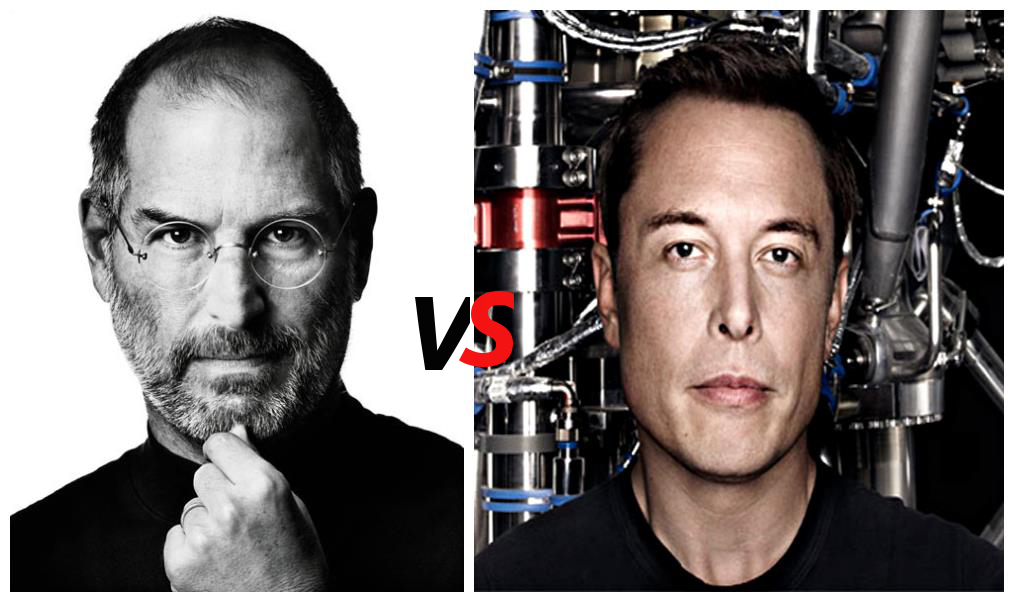
Feb 5, 2014 | Electric Vehicles, Entrepreneurship & Innovation
By Alison van Diggelen, host of Fresh Dialogues
Elon Musk has been hailed as the next Steve Jobs, a serial disruptor and a genius. Others call him just crazy. Yet Musk has defied the naysayers and made remarkable innovations in both electric cars and spaceflight over the last ten years. But just how accurate is the Steve Jobs comparison?
“Most innovation is like a new melody,” writes Ted curator Chris Anderson. “For Jobs and Musk, it’s the whole symphony.”
Anderson’s analogy is right. Neither men do things in small measures. They seek to change the world.
I interviewed Elon Musk last year in one of his most revealing public appearances, and he exposed a complex character that is both deadly serious yet comedic at times; driven yet sensitive; single minded, and yet eclectic in his desire to change the world in multiple ways.
.
That sensitivity was apparent several times during our dialogue when his eyes welled up in response to my questions about the future of NASA, Neil Armstrong, and candlelight vigils for the EV1 (@28:35, 1:04:00 & 39:50 in the video). Steve Jobs was also known to weep.
Musk has many traits in common with Jobs and yet in subtle ways their characters are distinct. Elon Musk vs Steve Jobs. The two did meet, but it didn’t go well.
Here are five revealing moments from our conversation that emphasize the common threads between the two businessmen.
1. Ability to Sell Great Ideas
Jobs used his infamous “reality distortion field” to push his teams hard to achieve much more that they thought was possible. His oft-quoted phrase was “insanely great” and his product launches were passionate and brash.
Musk is more pragmatic in his approach, he rarely uses buzzwords*, and although his product launches are often equally dazzling, his delivery is less assured, more halting.
*Granted, he does talk about getting a “money shot” of his greenhouse on Mars idea (@30:00 in the video).
“In the beginning there will be few people who believe in you or in what you’re doing but then over time… the evidence will build and more and more people will believe in what you’re doing. So, I think it’s a good idea when creating a company to … have a demonstration or to be able to sketch something so people can really envision what it’s about. Try to get to that point as soon as possible.” Elon Musk
This Word Art of our 90-minute conversation reveals no catchy buzzwords, though the word THINK stands out prominently.
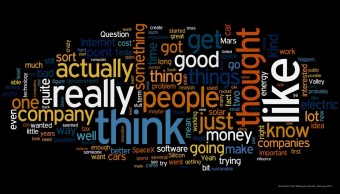
Source: Tyra Robertson
2. Obsessive Attention to Detail:
Stories abound of Steve Jobs’ intense attention to detail. He notoriously spent months agonizing over the internal layout of the Mac computer’s circuit board.
“I want it to be as beautiful as possible, even if it’s inside the box. A great carpenter isn’t going to use lousy wood for the back of a cabinet, even though nobody’s going to see it.” Steve Jobs
When his team failed to deliver on his vision, Jobs often flew into terrible rages. Case in point: the first fanless computer.
By contrast, Musk is known for his attention to detail and being a demanding boss, but he focuses his Vulcan rage at the media over issues like damning test drives, and Tesla car fires; and at foes such as auto dealerships.
His rage also turns inward. For example, when he discovered the wrong type of screw used in the Model S sun visors. He reportedly said, “they felt like daggers in my eyes.”
While doing pre-interviews with Musk’s colleagues, I heard a revealing story about his obsession with the Tesla Model S key fob. A colleague described how he agonized for weeks over the shape, the girth, the weight of the fob till it was just right. Take a peek at the end result and see if you think it was all worth it.
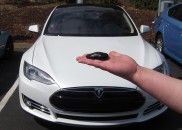
When I visited the Tesla factory (on assignment for KQED), I heard a similar story from the mechanics working on the iconic Model S door handles. Responsive door handles that sit flush with car doors looked like mission impossible, yet Musk and his team eventually prevailed. The result is so highly prized that my tour guide, Gilbert Passin (VP for manufacturing at Tesla) forbade me to take close-up photos of the components, for fear of copycats.
3. Ability to Think Differently Stems from Splendid Isolation
When I asked Musk if he was a lonely kid, he replied:
“I wasn’t all that much of a loner…at least not willingly. I was very very bookish.” Elon Musk
As a kid he was consumed by his own world, reading books like “The Hitchhiker’s Guide to the Galaxy,” and playing Dungeons and Dragons for hours. Musk found coding a piece of cake and created his own software at the tender age of 12. Thanks to his bookish childhood, his innovative ideas could flourish without being squashed by friends or family.
Similarly, Jobs had an isolated childhood, and was bullied at school. He did no competitive school sports and was obsessed by electronics and gadgets.
4. Deep Thinking
Although Jobs was less techie, more visionary; and Musk is a geeky engineer who prides himself on innovation using scientific first principles, both are deep thinkers.
Elon Musk explained how Hitchhiker’s Guide to the Galaxy inspired him while he was looking for the meaning of life as a teenager.
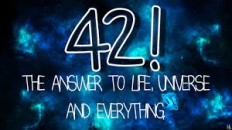 “It highlighted an important point, which is that a lot of times the question is harder than the answer. And if you can properly phrase the question, then the answer is the easy part. To the degree that we can better understand the universe, then we can better know what questions to ask. Then whatever the question is that most approximates: what’s the meaning of life? That’s the question we can ultimately get closer to understanding. And so I thought to the degree that we can expand the scope and scale of consciousness and knowledge, then that would be a good thing.” Elon Musk
“It highlighted an important point, which is that a lot of times the question is harder than the answer. And if you can properly phrase the question, then the answer is the easy part. To the degree that we can better understand the universe, then we can better know what questions to ask. Then whatever the question is that most approximates: what’s the meaning of life? That’s the question we can ultimately get closer to understanding. And so I thought to the degree that we can expand the scope and scale of consciousness and knowledge, then that would be a good thing.” Elon Musk
Walter Isaacson, the author of Jobs’ biography wrote that Jobs felt throughout his life that he was on a journey — and he often said, ‘The journey was the reward.’ But that journey involved resolving conflicts about his role in this world: why he was here and what it was all about. He had a lifelong interest in Zen Buddhism and they discussed whether or not he believed in an afterlife.
“Sometimes I’m 50-50 on whether there’s a God. It’s the great mystery we never quite know. But I like to believe there’s an afterlife. I like to believe the accumulated wisdom doesn’t just disappear when you die, but somehow it endures.” Steve Jobs
5. Impact
Although Musk isn’t yet the household name that Jobs has become, those who’re familiar with Musk’s work and genius compare him to Leonardo da Vinci and The Atlantic recently described him as one of the most ambitious innovators of this era. And what about Steve Jobs? He was described in the study as “a star of popular culture.”
Ouch!
During our interview, Musk shared the story of his brief encounter with the great Steve Jobs. The two were introduced by Google’s Larry Page at a party and Musk describes Jobs as being “super rude” to him. Nevertheless, this didn’t dent his admiration for the Apple guru. Here’s our dialogue:
Elon Musk: “The guy had a certain magic about him that was really inspiring. I think that’s really great.”
Alison van Diggelen: “Is it that magic that you try to emulate?”
Elon Musk: “No, I think Steve Jobs was way cooler than I am.”
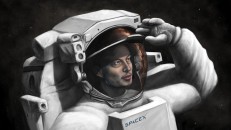 Although Apple fans will agree strongly with that assessment, feedback at YouTube loudly contradicts Musk. Here’s one of the more polite reactions:
Although Apple fans will agree strongly with that assessment, feedback at YouTube loudly contradicts Musk. Here’s one of the more polite reactions:
“Sounds just like Thomas Edison and Nikola Tesla. Except Elon Musk will probably end up being much more memorable than Steve Jobs :P”
As 2014 begins, Musk is still right, Steve Jobs is generally perceived as being “way cooler” than him. But that could change.
What will the history books conclude, in ten or twenty years from now? Steve Jobs certainly has big shoes to fill, but Elon Musk is already beginning to fill them. A lot will depend on Musk’s ability to see his grand visions come to fruition. First, he must complete his “Secret Master Plan for Tesla,” which includes the creation of a popular mass market electric car; and second, his vision of making space rockets reusable just like modern day jets.
One day, he may even achieve his life’s mission of dying on Mars, but as he describes it, “Just not on impact.”
Now that would be cool.

 2014 Plugged-In Conference Plenary Session: Ideas to Advance Electric Transportation
2014 Plugged-In Conference Plenary Session: Ideas to Advance Electric Transportation









